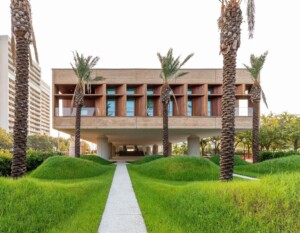Amid the sweltering, climate change–fueled heatwave sweeping across the U.S., the city of Austin is doing its part in sustainability and environmental health. The capital city announced on Monday that it has adopted a SITES certification requirement for its Parks and Recreation Department (PARD) projects—becoming the first city worldwide to do so.
SITES is administered by Green Building Certification Inc. (GBCI), a leading global health and sustainability certification entity; the program grants certifications to commercial, residential, and institutional, streetscaping, and landscaping projects of at least 2,000 square feet. It primarily examines a project’s landscaping, ensuring its terrain is working to reduce water and energy consumption and improve air quality and human health. The certification criteria is shaped by a set of guiding principles that place human and environmental health at the forefront and encourage continued ethical collaboration and research.
“By using the SITES framework to guide the development of our landscape projects, PARD hopes to improve quality of life and human health by supporting and regenerating our ecosystem and built environment,” said PARD Assistant Director Liana Kallivoka. “Clean air and water, and a thriving ecosystem are essential to the health and well-being of humans and all life around us.”
The GBCI also manages Leadership in Energy and Environmental Design (LEED) certification. The Austin city council voted to mandate that projects receive a LEED silver certification, or higher, in 2000.
“The City of Austin was one of the first in the world to formally adopt LEED and is now proud to continue its leadership in sustainability and green building by being the first to adopt SITES certification standards for our significant park projects,” said City of Austin’s Chief Sustainability Officer Lucia Athens.
While LEED considers both the project’s building and its surroundings, SITES focuses specifically on all project aspects except for the building. The two environment-focused certifications are complementary and can be used in tandem, according to GBCI’s website; projects that receive specific certifications from SITES can earn credits in the LEED program.
The adoption of SITE certification is a part of Austin’s continued efforts to make its spaces more environmentally resilient and reduce the harmful affects that projects can have on existing ecologies. The city mentioned in a press release that the Waterloo Greenway Confluence project is on track for a SITES Gold certification as construction is set to begin later this year.
“SITES is a globally recognized and implemented leadership standard, but its roots are in Austin,” said Danielle Pieranunzi, SITES Director. “As an Austin resident myself, I’m proud to see the city acting on its commitment to a more sustainable, ecologically resilient future for its community members to enjoy.”











